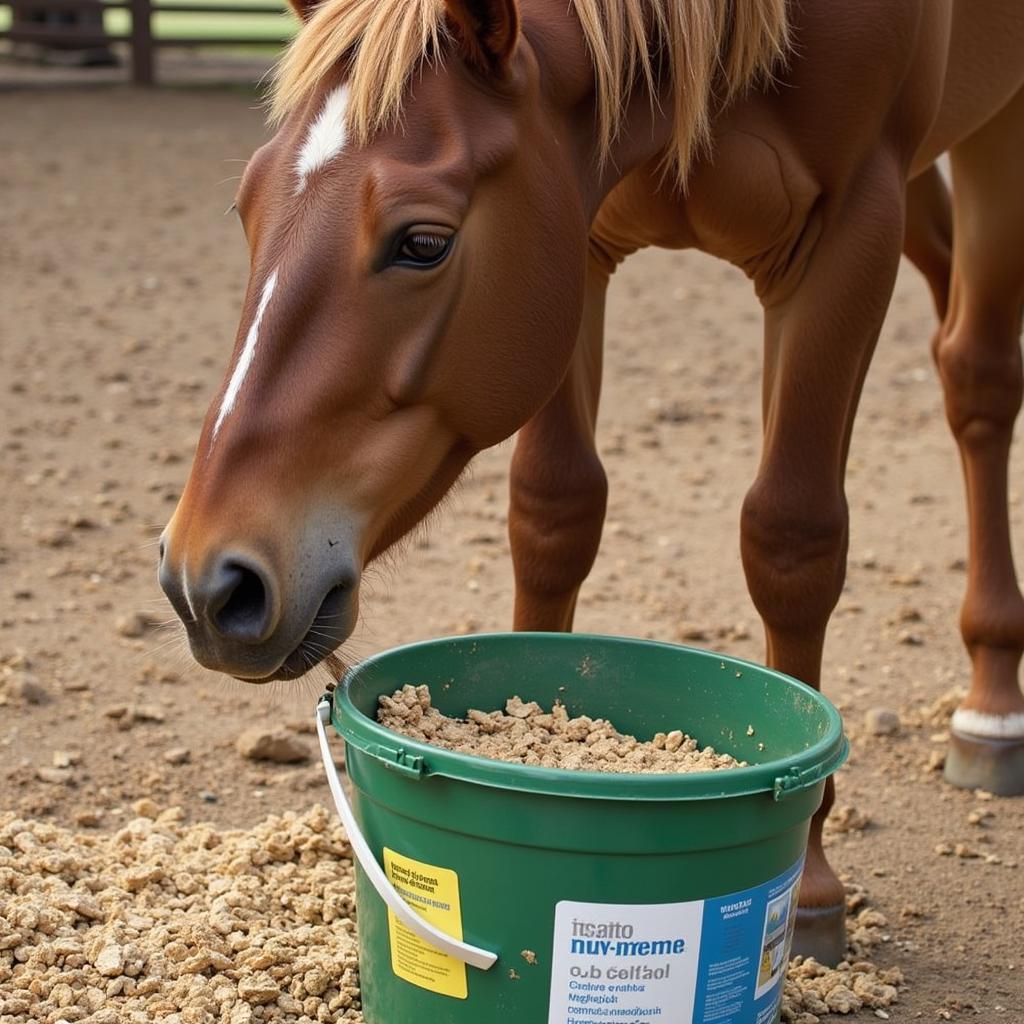Magnesium deficiency in horses, often overlooked, can lead to a range of concerning symptoms. Understanding these symptoms is crucial for early detection and effective management, ensuring your horse’s health and well-being. This article delves into the complexities of magnesium deficiency, providing you with the knowledge to recognize and address this important equine health concern.
Recognizing the Subtle Signs of Magnesium Deficiency
Magnesium plays a vital role in numerous bodily functions in horses, including nerve and muscle function, enzyme activity, and energy metabolism. When magnesium levels dip below optimal ranges, a cascade of seemingly unrelated symptoms can manifest. These symptoms can range from subtle behavioral changes to more overt neuromuscular issues.  Horse Showing Nervousness Due to Magnesium Deficiency
Horse Showing Nervousness Due to Magnesium Deficiency
Behavioral Changes: The First Red Flags
One of the earliest indicators of magnesium deficiency in horses can be a shift in their usual demeanor. Horses might become more anxious, irritable, or easily spooked. They might also exhibit increased sensitivity to touch or sound. This heightened reactivity can make handling and training challenging. These seemingly minor behavioral changes should not be dismissed, as they could be the first signs of an underlying magnesium imbalance. If you notice your horse displaying unusual nervousness or excitability, consult with your veterinarian to explore the possibility of magnesium deficiency.
Muscle Tremors and Twitches: A Clear Warning Sign
As magnesium deficiency progresses, more pronounced neuromuscular symptoms may emerge. Muscle tremors, twitching, and fasciculations (small, involuntary muscle contractions) are common manifestations. These symptoms can affect various muscle groups, including those in the face, neck, and limbs.  Horse Experiencing Muscle Fasciculations from Magnesium Deficiency In severe cases, muscle spasms and even seizures can occur. For instance, you might notice your horse experiencing involuntary muscle contractions in the face, such as twitching of the eyelids or lips. You can learn more about specific magnesium supplements like mag ox for horses.
Horse Experiencing Muscle Fasciculations from Magnesium Deficiency In severe cases, muscle spasms and even seizures can occur. For instance, you might notice your horse experiencing involuntary muscle contractions in the face, such as twitching of the eyelids or lips. You can learn more about specific magnesium supplements like mag ox for horses.
Understanding the Causes of Magnesium Deficiency
Several factors can contribute to magnesium deficiency in horses. Poor dietary intake is a primary cause, particularly in horses grazing on pastures deficient in magnesium or consuming low-quality hay. Stress, strenuous exercise, and certain medical conditions can also increase magnesium requirements and potentially lead to deficiency if dietary intake is not adjusted accordingly. Certain medications can also interfere with magnesium absorption, exacerbating the problem. Knowing the potential causes can help you proactively address the risk factors and ensure your horse receives adequate magnesium.
How is Magnesium Deficiency Diagnosed?
Diagnosing magnesium deficiency in horses typically involves a combination of blood tests, dietary analysis, and clinical evaluation of the observed symptoms. Blood tests can measure serum magnesium levels, providing a snapshot of the horse’s current magnesium status. However, serum magnesium levels may not always accurately reflect the total body magnesium stores, as magnesium is primarily stored within cells and tissues. Therefore, dietary analysis is also essential to assess the horse’s magnesium intake. Your veterinarian will carefully consider your horse’s diet, including the type of forage, pasture quality, and any supplements provided. For accurate information on administering minerals, explore our guide on adm minerals for horses.
Treating and Preventing Magnesium Deficiency
Addressing magnesium deficiency requires a multifaceted approach. Dietary adjustments are often the first step. This may involve supplementing the horse’s diet with magnesium oxide, magnesium sulfate, or other magnesium-rich supplements.  Horse Receiving Magnesium Supplement
Horse Receiving Magnesium Supplement
In acute cases, intravenous magnesium supplementation may be necessary to rapidly restore magnesium levels. For a broader understanding of horse minerals, visit our horse mineral resource page. Considering electrolytes is crucial as well, so check out our information on apple a day electrolytes for horses. Additionally, addressing any underlying medical conditions or stressors contributing to the deficiency is crucial for long-term management. You can also learn about magnesium citrate for horses.
Dr. Amelia Shepherd, an equine veterinarian with over 20 years of experience, emphasizes, “Early detection is key. Don’t dismiss subtle behavioral changes. Prompt diagnosis and treatment can prevent more serious complications.”
Dr. David Brown, a renowned equine nutritionist, adds, “A balanced diet is the foundation of equine health. Regularly assess your horse’s diet to ensure adequate magnesium intake, especially during periods of stress or intense exercise.”
Conclusion
Recognizing the Symptoms Of Magnesium Deficiency In Horses is essential for their overall health and performance. By understanding the subtle signs, you can take proactive steps to address this often-overlooked nutritional deficiency. Consult your veterinarian for appropriate diagnosis and treatment to ensure your horse receives the care they need.
FAQ
- What are the common symptoms of magnesium deficiency in horses?
- How is magnesium deficiency diagnosed in horses?
- What are the treatment options for magnesium deficiency in horses?
- How can I prevent magnesium deficiency in my horse?
- What are the long-term consequences of untreated magnesium deficiency in horses?
- What role does magnesium play in equine health?
- Are certain breeds of horses more prone to magnesium deficiency?
For immediate assistance, please contact us at Phone: 0772127271, Email: [email protected] or visit our location: QGM2+WX2, Vị Trung, Vị Thuỷ, Hậu Giang, Việt Nam. We have a 24/7 customer support team.